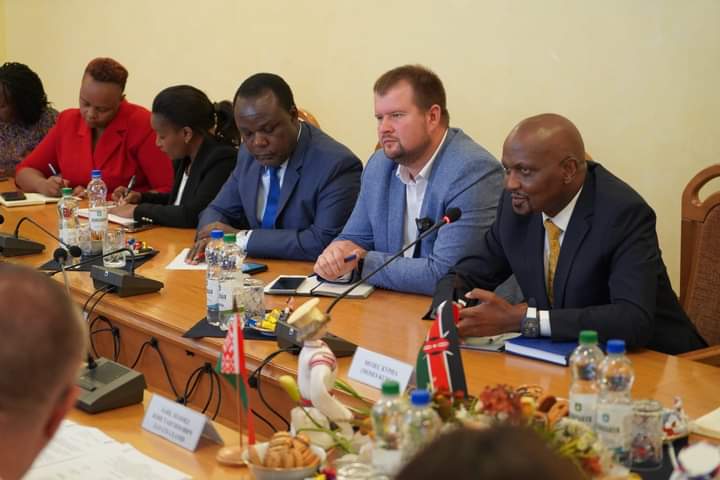Kenya and Belarus Forge Collaborative Partnership to Enhance Agriculture and Tackle Climate Change Challenges
In a significant development, Hon. Moses Kuria, the Minister of Agriculture of Kenya, along with his colleague from agriculture, Hon. Mithika Linturi, met with Deputy Prime Minister H.E. L.K. Zayats and his delegation from the Republic of Belarus. The purpose of the meeting was to explore opportunities for collaboration between the two nations in the field of agriculture, as well as to address the challenges posed by climate change.
During the meeting, extensive discussions were held regarding potential areas of cooperation in agriculture. Recognizing the importance of sustainable farming practices, the participants agreed on a three-phase cooperative structure. This structure aims to develop farming techniques utilizing water-saving technologies and enhance processing systems such as input and machinery.
The three-phase cooperative structure entails the following:
Knowledge sharing and capacity building: Kenya and Belarus will engage in the exchange of expertise and knowledge regarding modern farming techniques, including water-saving technologies. This collaboration will involve training programs to enhance the skills of farmers in both countries.
Implementation of advanced farming practices: The two nations will collaborate on the implementation of water-saving technologies, optimizing input usage, and adopting efficient machinery. These measures are expected to improve productivity in the agricultural sector significantly.
Processing and value addition: Emphasis will be placed on the development of processing systems to add value to agricultural produce. By enhancing processing capabilities, Kenyan agricultural products are expected to become more competitive in both domestic and international markets.
In addition to the agricultural collaboration, the participants also discussed the pressing issue of climate change. They acknowledged the adverse effects of climate change, including frequent and severe droughts, erosions, heatwaves, and infrastructure concerns, which pose significant economic risks.
To mitigate these effects, Kenya and Belarus agreed to cooperate closely. Their joint efforts will focus on lessening the adverse impacts of climate change on the agricultural sector and the overall economy. Key areas of cooperation identified include research and development, information exchange, and infrastructure development.
By working together, the collaborative efforts between Kenya and Belarus in agriculture and climate change mitigation are expected to yield substantial benefits. The adoption of water-saving technologies, advanced processing systems, and efficient farming practices will lead to a dramatic increase in agricultural output. Consequently, this will enhance food security in Kenya, reduce dependence on imports, and contribute to the income growth of farmers.
Furthermore, by addressing climate change challenges, including droughts, erosions, and heat waves, the collaboration between the two nations will bolster the resilience of Kenya's agricultural sector. The implementation of climate-smart practices and the development of necessary infrastructure will minimize economic risks and ensure sustainable agricultural growth.
In conclusion, the meeting between Hon. Moses Kuria, Deputy Prime Minister H.E. L.K. Zayats, and their respective teams marked an important milestone in the collaboration between Kenya and Belarus in the fields of agriculture and climate change mitigation. The agreed-upon three-phase cooperative structure, coupled with the shared commitment to address climate change challenges, is expected to have a transformative impact on the agricultural output and food security of Kenya.

